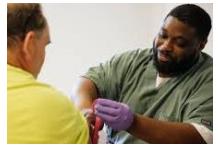Marginalized communities have long experienced worse health outcomes and are less likely to receive the medical care they need. That’s true of people of color, LGBTQ+ individuals, people experiencing homelessness, and others as well.
These striking injustices are one of the modern-day effects of a long history of discriminatory practices, policies, and traditions.
Access to health care is just a single aspect of a person’s health. Race and ethnicity, housing situation, employment status, living environment, and spoken language, among other interrelated factors, will all play significant roles in an individual’s health outcomes.
Direct Relief’s Fund for Health Equity provides financial support to community health centers, free and charitable clinics, educational institutions and other community-based organizations fighting the inequities that further health disparities.
